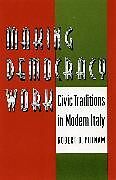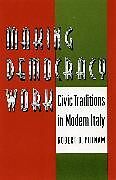Making Democracy Work
Einband:
Kartonierter Einband
EAN:
9780691037387
Untertitel:
Civic Traditions in Modern Italy
Autor:
Putnam Robert D., Robert Leonardi, Raffaella Y. Nanetti
Herausgeber:
University Press Group Ltd
Anzahl Seiten:
272
Erscheinungsdatum:
16.06.1994
ISBN:
978-0-691-03738-7
Zusatztext "Seminal! epochal! path-breaking: All those overworked words apply to a book that! to make the point brazenly! is a Democracy in America for our times." ---David L. Kirp! The Nation Zusammenfassung Why do some democratic governments succeed and others fail? In a book that has received attention from policymakers and civic activists in America and around the world! Robert Putnam and his collaborators offer empirical evidence for the importance of "civic community" in developing successful institutions. Their focus is on a unique experiment begun in 1970 when Italy created new governments for each of its regions. After spending two decades analyzing the efficacy of these governments in such fields as agriculture! housing! and health services! they reveal patterns of associationism! trust! and cooperation that facilitate good governance and economic prosperity. Informationen zum Autor Robert D. Putnam is Dillon Professor of International Affairs and Director of the Center for International Affairs at Harvard University. His many books include Hanging Together: The Seven-Power Summits (Harvard). Robert Leonardi is Jean Monnet Lecturer in European Community Politics at the London School of Economics! and Raffaella Y. Nanetti is Professor of Urban Planning and Policy Analysis at the University of Illinois at Chicago. Klappentext Why do some democratic governments succeed and others fail? In a book that has received attention from policymakers and civic activists in America and around the world! Robert Putnam and his collaborators offer empirical evidence for the importance of "civic community" in developing successful institutions. Their focus is on a unique experiment begun in 1970 when Italy created new governments for each of its regions. After spending two decades analyzing the efficacy of these governments in such fields as agriculture! housing! and health services! they reveal patterns of associationism! trust! and cooperation that facilitate good governance and economic prosperity. ...
"A remarkable study of 'civic traditions.'"---Steven Lukes, Times Literary Supplement
Autorentext
Robert D. Putnam With Robert Leonardi and Raffaella Y. Nanetti
Klappentext
Why do some democratic governments succeed and others fail? In a world full of hope for democratization but wary of government failure, this book offers empirical evidence for the importance of civic community in developing successful institutions. As part of a unique experiment begun in 1970 when Italy created new governments for each of its regions - regions that vary greatly from the standpoint of wealth, social structure, and political leanings - Robert Putnam and his collaborators spent two decades evaluating the performance of these governments in such fields as agriculture, housing, and health services. Their findings were surprising: regions that enjoy effective government in the 1990s have inherited a legacy of civic engagement that can be traced back to the early Middle Ages. Just as Tocqueville traveled to America to try to understand democracy, Putnam and his colleagues draw broad lessons for democratic theory from their twenty-year journey through Italy. Their conclusions challenge the simple-minded thesis of the primacy of economics and the easy optimism of social engineers. Based on dozens of case studies and thousands of interviews with politicians, community leaders, and ordinary citizens, this book illuminates patterns of associationism, trust, and cooperation that facilitate good governance and economic prosperity. It also contributes to the discussion of democracy in the newly freed lands of Eurasia and the developing world and to the gathering debate about how to revitalize democracy in America.
Zusammenfassung
Why do some democratic governments succeed and others fail? This book offers empirical evidence for the importance of 'civic community' in developing successful institutions. It focuses on an experiment begun in 1970 when Italy created new governments for each of its regions.

Leider konnten wir für diesen Artikel keine Preise ermitteln ...
billigbuch.ch sucht jetzt für Sie die besten Angebote ...
Die aktuellen Verkaufspreise von 6 Onlineshops werden in Realtime abgefragt.
Sie können das gewünschte Produkt anschliessend direkt beim Anbieter Ihrer Wahl bestellen.
Loading...
Die aktuellen Verkaufspreise von 6 Onlineshops werden in Realtime abgefragt.
Sie können das gewünschte Produkt anschliessend direkt beim Anbieter Ihrer Wahl bestellen.
| # | Onlineshop | Preis CHF | Versand CHF | Total CHF | ||
|---|---|---|---|---|---|---|
| 1 | Seller | 0.00 | 0.00 | 0.00 |
